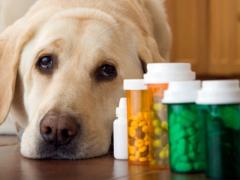Medication Madness

Medication Madness
Several months ago, I blogged tips for getting your sick pet to eat and take his medications.
This week, I thought I would give tips for the pet owner to help safely and correctly administer medications.
Prescribing medications starts at the scale. At The Animal Medical Center (AMC), we weigh pets in kilograms, a great frustration to many pet owners who carefully monitor their pet’s weight in pounds. We do this because most drug dosages are given in mg/kg and weighing in kilograms eliminates one step (and one potential place for error) in the calculation of a drug dosage.
If you multiply the weight in kilograms by 2.2 you get the weight in pounds or ask the staff at your veterinarian’s office to weigh your pet in pounds for you. Most scales have a switch you flip to toggle between pounds and kilograms.
Liquid medications are commonly prescribed for cats and small dogs. Most liquid medications have a short shelf life and you will be called upon to reconstitute a second bottle if your pet needs a long treatment. If you have to reconstitute the medication, read the directions carefully. At the AMC, we include the correct sized syringe to measure the water accurately into the bottle. Make sure you know exactly how much water to add so the medication is neither too weak nor too strong.
Before you leave the veterinarian’s office, make sure you have the answers to the following questions regarding your pet’s new prescription.
- If you have never given your pet medications, ask the veterinarian or the veterinary technician for a lesson.
- Should the medication be given with, without food or in no particular relationship to feeding?
- Can the medication be given with any other prescriptions your pet is taking?
- If your pet is very difficult to medicate, ask which are the most important medications to administer. Give the most important medications first, in case your pet becomes resistant and you become unsuccessful at medicating.
- If you pet is very difficult to medicate, ask if the medication is available in any other form, i.e., liquid, not pills, injections, not liquids, or even a transdermal gel.
- How should the medication be stored and if it is a liquid, does it need to be shaken?
- If you miss a dose or find a pill under the sofa cushions, what should you do?
- What would a medication reaction look like and how should you respond?
This blog may also be found in the “Tales from the Pet Clinic” blog from WebMD.
________________________________________________
For over a century, The Animal Medical Center has been a national leader in animal health care, known for its expertise, innovation and success in providing routine, specialty and emergency medical care for companion animals. Thanks in part to the enduring generosity of donors, The AMC is also known for its outstanding teaching, research and compassionate community funds. Please help us to continue these efforts. Send your contribution to: The Animal Medical Center, 510 East 62nd Street, New York, NY 10065. For more information, visit www.amcny.org. To make an appointment, please call 212.838.7053.


































